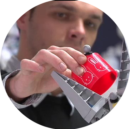on 6 June 2016
by Beste
Biography Abstract Open-ended learning, also named `life-long learning’, `autonomous curriculum learning’, `no-task learning’) aims to build learning machines and robots that are able to acquire skills and knowledge in an incremental fashion. The REAL competition, which is part of NeurIPS 2019 competition track, addresses open-ended learning with a focus on `Robot open-Ended Autonomous Learning’ (REAL), that is on systems that: (a) acquire sensorimotor competence that allows them to interact with objects and physical environments; (b) learn in a fully autonomous way, i.e. with no human intervention, on the basis of mechanisms such as curiosity, intrinsic motivations, task-free reinforcement learning, self-generated goals, and any other mechanism that might support autonomous learning. The competition will have a two-phase structure where during a first ‘intrinsic phase’ the system will…
Bio Details →




